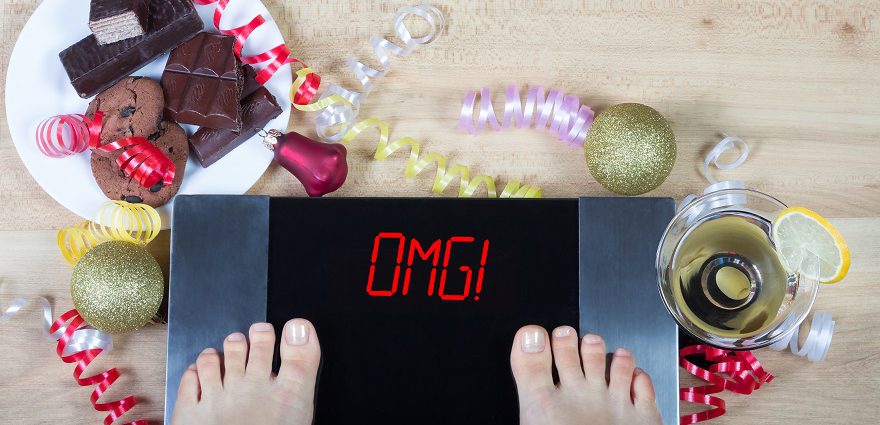12 Ways to Avoid Weight Regain During the Holidays

‘Tis the season to be jolly, spend time with family and friends, celebrate life’s little blessings and of course, eat.
The holiday season and food go hand in hand. Whether sweet potato pie, honey-glazed ham, buttery Christmas cookies or turkey and stuffing, holiday eating takes its toll on our health and our waistline. In fact, people tend to gain an average of five to 10 pounds between Thanksgiving and New Year’s.
Preventing holiday weight gain is a challenge for everyone, including people who have had bariatric surgery such as Lap-Band or gastric bypass surgery.
“This may not be such a big issue in the first year after weight loss surgery as this is when a person can’t consume as much food as they used to without feeling sick,” explains Silvia Veri, RD, the nutrition supervisor for the weight control center at Beaumont Hospital in Royal Oak, Michigan. “The challenge arrives a year or so later because that is when people can tolerate eating more food and sugar.”
The good news is that holiday weight gain is not inevitable. You can avoid packing on those unsightly pounds by following these 12 simple tips:
Never arrive hungry. Eat every three or four hours, and always take a protein bar, protein shake or healthy snack with you so you don’t arrive at the fete famished.
Eat the turkey or ham first. People who have had bariatric surgery to battle obesity are told to eat protein first, and the holidays are no exception. Protein is essential for wound healing, preserving lean body mass, enhancing fat-burning metabolism and minimizing hair loss after weight loss surgery. Since individuals who have had bariatric surgery can only tolerate small amounts of food, it is essential to eat protein first. After you have eaten your protein, take a few, small bites of your favorite dishes.
Drink water or other non-caloric beverages. Coffee and tea, which are very low in calories, are staples at many holiday parties, and often come in festive flavors.
Chew gum. Chewing sugar-free gum can satisfy your oral fixation and curb your appetite at a party.
Chew slowly. A new study slated for publication in the Journal of Clinical Endocrinology & Metabolism shows that eating a meal quickly inhibits the release of hormones in the gut that induce feelings of being full, resulting in overeating.
Tweak your favorite holiday recipes. You can enjoy some of your yuletide favorites without sacrificing your waistline. Let’s say you grew up eating the classic green bean casserole. Choose fat-free mushroom soup instead of the heavy cream version, and sprinkle just a handful of fried onions atop the casserole as opposed to the whole can. Many people who have had weight loss surgery are sensitive to sugar. Try making your favorite dessert — such as pumpkin pie — with Splenda instead.
Bring a vegetable or fruit tray. Bring something that you can eat an unlimited amount of so you won’t go hungry or risk binging on fattening fare.
Avoid the egg nog. High-calorie beverages like egg nog won’t fill you up, so they are not a good choice. Alcohol can also lower your inhibitions, making the buffet table hard to resist.
Socialize. Make your holiday about reconnecting instead of chowing down. Holidays are for family and friends, not food.
Start new traditions. Plan to take a walk or play touch football with relatives instead of having an extended happy hour. Regular exercise can help maintain weight loss.
Sit far away from buffet or kitchen. Sure, front-row or courtside seats may be ideal for sporting events, but if you are trying to keep your weight down, sitting far away from the buffet or kitchen during the holidays is a good call.
Give it away. Don’t keep leftovers lying around. Donate the excess to a local homeless shelter or pack up doggie bags for family members and friends.
Remember, the holidays are also about forgiveness. If you do end up overindulging, give yourself a break. Get right back on track the following day by recommitting to healthy eating and regular exercise. “Don’t beat yourself up and throw in the towel,” says Jacqueline Stark Odom, PhD, the director of psychology at the Beaumont Weight Control Center in Royal Oak, Michigan. Instead, “redirect your thinking into letting the episodes go and moving forward or by calling your surgeon for a referral to a nutritionist who can help get you back on track,” she says. “Make that your new year’s resolution.”
Suggested reading
- Weight loss surgery recovery
- Bariatric surgery revision
- Sex after bariatric surgery
- Pregnancy after bariatric surgery
About the Reviewer of This Article
Jacqueline Stark Odom, PhD, is a fully licensed psychologist who specializes in weight management and addiction. Dr. Odom has worked in this field for over 25 years. She is currently the Director of Psychology at the Beaumont Weight Control Center, Beaumont Hospital, Royal Oak, Michigan. Dr. Odom manages the psychological services provided to an adult out-patient weight management program, pre and post-op psychological services for bariatric surgery patients and an obesity program for children and families. She has lectured and published extensively on all aspects of psychological and behavioral weight management.


